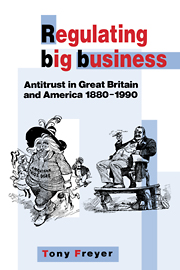Book contents
- Frontmatter
- Contents
- Preface
- Introduction
- 1 The response to big business: the formative era, 1880–1914
- 2 The divergence of economic thought
- 3 The political response
- 4 The courts respond to big business
- 5 The impact of World War I, 1914–1921
- 6 Tentative convergence, 1921–1948
- 7 A British antimonopoly policy emerges, 1940–1948
- 8 Uneven convergence since World War II
- Conclusion
- Notes
- Index
5 - The impact of World War I, 1914–1921
Published online by Cambridge University Press: 21 January 2010
- Frontmatter
- Contents
- Preface
- Introduction
- 1 The response to big business: the formative era, 1880–1914
- 2 The divergence of economic thought
- 3 The political response
- 4 The courts respond to big business
- 5 The impact of World War I, 1914–1921
- 6 Tentative convergence, 1921–1948
- 7 A British antimonopoly policy emerges, 1940–1948
- 8 Uneven convergence since World War II
- Conclusion
- Notes
- Index
Summary
The war changed attitudes and policies toward combinations and restrictive practices. During the period of hostilities, each nation's governmental authorities approved cooperative and restraining agreements within the business order, a policy which for different reasons the two labor movements also supported. Even so, during the post-war reconstruction era of 1919–1921 neither British law nor the short-lived Profiteering Acts represented more than a limited public or official concern for the welfare of small business, despite the unprecedented growth of monopoly. After the Armistice, by contrast, various American interests debated whether the continuation of cooperation and the antitrust laws were reconcilable. Meanwhile, neoclassical economic thought and a popular if qualified faith in rationalization eroded the British Free Trade consensus, sustaining a modest expansion of the state's supervisory role. And yet the ambiguous experience of the Standing Committee on Trusts suggested a need for a stronger policy. In America the agreement of Louis D. Brandeis and Herbert Hoover on the usefulness of trade associations indicated that the ascendancy of neoclassical economic thought had not altogether supplanted republican values. As a result, the federal government's and the Supreme Court's application of the rule of reason permitted considerable ambivalence in the enforcement of antitrust.
WAR-TIME COOPERATION, PRESSURE GROUPS, AND GOVERNMENTAL POLICY
Although America entered the war nearly three years after Britain, each nation's war effort was similar. Mobilization required an unprecedented level of government-business collaboration, stimulating, often for the first time, trade organizations for the allocation of raw materials, cooperative research projects, and control of prices and output.
- Type
- Chapter
- Information
- Regulating Big BusinessAntitrust in Great Britain and America, 1880–1990, pp. 159 - 195Publisher: Cambridge University PressPrint publication year: 1992



